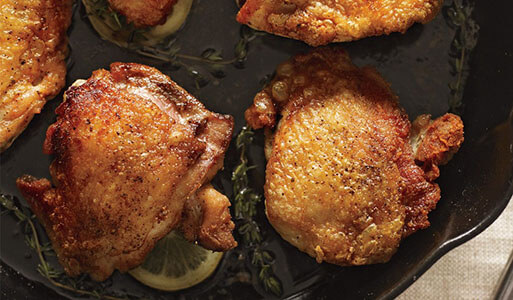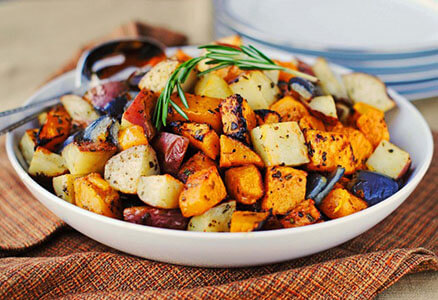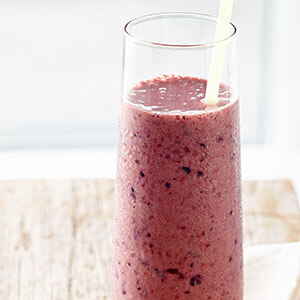Mesothelioma Cancer Fighting Foods & Recipes
The best way for mesothelioma patients to preserve muscle and support their immune systems is by eating a high-protein diet. Good protein-rich options include chicken, fish, Greek yogurt, soy, eggs, nuts and cheese. Fruits and vegetables are also an important staple in a mesothelioma diet.
Cancer-Fighting Foods
Cancer-fighting foods that boost your immune system include protein, fruits and vegetables. Healthy proteins consist of fish, meat, nuts and soy. Healthy fruits and vegetables include berries, grapes, tomatoes, spinach, broccoli and carrots.
All mesothelioma patients can benefit from cancer-fighting foods, but not for the reason many people believe. The idea that foods fight cancer may seem like nutrients kill tumor cells, similar to how mesothelioma treatment works.
There is limited evidence that shows vitamin D may have anti-cancer effects. However, a recent study out of Italy suggests that vitamin D may play an important anti-cancer role in malignant pleural mesothelioma. While further studies need to be conducted, preliminary findings suggest it may complement mesothelioma treatments such as chemotherapy.
However, this isn’t how nutrition affects the body. Instead, healthy foods boost your body’s natural ability to fight cancer. They support immune function and promote healing and recovery. This allows you to stay on track with your treatment schedule and medication doses. Getting all your planned therapy is critical to achieving optimal tumor control.
Proteins: Chicken, Fish, Dairy, Meat, Eggs and More
Protein is among the most important nutrients for a mesothelioma patient. Excellent protein-rich options include chicken, fish, dairy, meat, eggs and beans.
Fish are also a good source of vitamin D, which is an important vitamin mesothelioma patients often lack. A 2021 clinical research study found that patients with asbestos-related diseases such as mesothelioma had lower vitamin D levels than their healthy counterparts.
- Chicken
- Fish
- Lean beef and pork
- Greek yogurt
- Beans, lentils and peas
- Soy foods
- Eggs
- Nuts
- Cheese
Regardless of your usual weight — whether thin, average or overweight — your body needs extra protein after a mesothelioma diagnosis. Even if you feel you have “room to spare” and some extra body weight, you should do everything you can to avoid losing weight during treatment.
Tips to Add Protein to Your Diet
Maintaining weight and eating plenty of protein during treatment is the best way to preserve muscle and support immune cell repair and regeneration.
- Snack on cheese, sliced meats, nuts and nut butters
- Add cheese or cooked meats to sandwiches, omelets, salads, soups and casseroles
- Add powdered milk to whole milk, smoothies, milkshakes, creamy soups and mashed potatoes
- Blend protein powder, ice cream, yogurt or nut butters into smoothies
Most cancer patients should aim to eat 0.65 to 0.75 grams of protein per pound of body weight each day. For example, a person who weighs 175 pounds should try to eat 114 to 131 grams of protein daily.

Protein is specifically related to, outcomes. We know that patients that have better protein levels, such as their albumin and pre-albumin are actually relatively O.K., that they can withstand a surgery and chemotherapy and they can do well.
Best Fruits and Vegetables for Fighting Mesothelioma Cancer
Some of the best fruits and vegetables for people with mesothelioma include dark berries, brightly colored stone fruit, purple and white potatoes, orange sweet potatoes, yellow yams and orange and yellow squash.
The best vegetables for cancer patients include yellow, white, orange and purple root vegetables. Purple, red and blue fruit, including berries and stone fruit, are among the most potent cancer-fighting foods in the diet. Those bright colors signal the presence of antioxidants and other cancer-fighting nutrients.
Beneficial Vegetables for a Mesothelioma Diet
Colorful plant foods are among the top cancer-fighting items in a diet. This includes all vegetables, but for people with mesothelioma, it’s helpful to include calorie-rich options.
- Purple and white potatoes
- Orange sweet potatoes
- Yellow yams
Many people in mesothelioma treatment struggle to get enough to eat. Good nutrition helps the body weather difficult cancer therapy and fuels recovery. For this reason, focus on vitamin- and mineral-rich options that also provide energy.
Beneficial Fruit for a Mesothelioma Diet
Combining fruit with some protein and fat offers the body calories, vitamins and minerals needed during cancer therapy. These important substances can support healing and recovery during and after mesothelioma treatment. Try to include nutrient-rich fruit — fresh or frozen — in your cancer-fighting food plan.
- Cherries
- Blueberries
- Blackberries
- Strawberries
- Raspberries
- Black raspberries
- Cranberries
- Boysenberries
- Mulberries
- Red and black currants
- Salmon berries
Some of these items are only fresh for a few weeks a year. Frozen fruit retains the same nutrients as fresh, and may be less expensive and easier to find.
Thoroughly wash produce under running water. Using soap is not recommended. Wash hands for 20 seconds with plain soap and running water immediately after handling unwashed produce. Never use the same cutting board for produce, meat and seafood, and washboards immediately after use.

Foods Mesothelioma Patients Should Avoid
People with mesothelioma may want to avoid certain foods and beverages during treatment to steer clear of potential toxins and ensure their body is nourished properly.
For example, patients should limit or cut out alcohol during treatment because it damages human cells and their DNA, and may negatively interact with certain medications. Cancer patients should also focus on eating nutritious foods and avoiding sugary foods empty of nutrients.
For those who want to lower their risk of other cancers, avoiding red and processed meats will reduce the risk of stomach and colorectal cancer. Examples of processed meats include ham, bacon, sausage and hot dogs.
Cancer-Fighting Recipes for a Healthy Diet
Consider the following nutritious recipes for a healthy diet during and after cancer treatment. This collection of recipes includes satisfying protein and delicious fruits and vegetables.
High-Protein Recipe
Perfect Pan-Seared, Oven-Roasted Roast Chicken Thighs
Servings: 3

Ingredients
- 6 skin-on, bone-in chicken thighs (about 2 1/4 pounds)
- Salt and freshly ground black pepper, to taste
- 2 tablespoons olive oil
- Herbs and spices, to taste
Preparation
- Preheat oven to 475 F
- Season chicken with salt and pepper
- In a cast-iron, oven-safe skillet, heat oil over medium-high heat until hot, but not smoking
- Place chicken thighs skin down and cook 2 minutes on medium-high
- Reduce heat to medium and cook about 12 minutes, until skin is golden brown
- Move thighs around the skillet to ensure even heating
- Transfer skillet to oven and cook an additional 13 minutes
- Flip chicken and cook another 7 minutes, until skin is crispy and meat is cooked through
- Check to make sure internal temperature of chicken reaches at least 165 F
- Transfer to a plate and let sit 5 minutes before serving
Herbs and spices can help reduce metallic and unpleasant tastes that can occur during chemotherapy. Try fresh or dried rosemary, oregano, basil or thyme. Adding a bit of sweetness with a light brushing of honey or maple syrup at the end of cooking also may improve flavor for mesothelioma patients.
Nutrition information per serving: 370 calories; 36 g protein; 25 g fat; 0 g carbohydrates
Root Vegetables Recipe
Roasted Potatoes, Yams and Squash
Servings: 5

Ingredients
- 1 medium orange sweet potato or fresh pumpkin, if seasonal
- 1 medium yellow yam or sweet potato
- 1 small acorn or half of a butternut squash (add extra potato and yam if squash is out of season)
- 3 tablespoons olive oil
- Dash of salt and pepper, to taste
- Fresh or dried herbs — basil, oregano, marjoram, thyme, parsley or rosemary
- Preheat oven to 450 F
- Wash and dry vegetables
- Peel and chop squash into roughly 1-inch pieces
- Chop potatoes, skin on, into 1-inch pieces
- Place vegetables into 3-quart glass baking dish (approximately 12 inches by 9 inches)
- Add olive oil and stir to coat food
- Sprinkle with salt, pepper and herbs
- Bake for 20-25 minutes, stirring once halfway through baking time
- Remove from oven and serve immediately
Nutrition information per serving: 177 calories; 3 g protein; 8 g fat; 23 g carbohydrates
If you enjoy grilling, you may brush whole potatoes in olive oil, sprinkle with herbs and salt, wrap in foil and place on the grill for 10 minutes, flipping halfway through. Open foil carefully, using tongs, to avoid contact with escaping steam. Poke potatoes with a fork to determine if they are cooked through. If not, cook to desired doneness, rewrap and return to grill for another few minutes.
Fruit Smoothie Recipe
Berry-Cherry, High-Protein Smoothie
Servings: 1

Ingredients
- 1 cup nonfat Greek yogurt
- 1/2 cup frozen cherries
- 1/2 cup frozen blueberries
- 1 cup whole milk or nondairy option, if preferred (to blend to desired consistency)
Preparation
- Combine all ingredients in a blender
- Begin blending, adding a little milk at a time to combine to desired consistency
Nutrition information per serving: 485 calories; 29 g protein; 9 g fat; 72 g carbohydrates
If you have been advised to avoid frozen and cold foods during treatment, add berries to other foods such as oatmeal or cereal. If things taste too sweet, try substituting frozen cranberries with blueberries.

Treat Food Like Medicine
Some people struggle to eat enough during cancer treatment. If this is a problem for you, treat food like medication.
You may not feel hungry, but setting a timer to take a few bites or sips of food every hour can help you squeeze more calories and protein into your day. Do this for all the foods you can eat during cancer care.
My diet is high protein, high calorie and low fiber. I get to eat everything you’re not supposed to eat – lots of pasta, lots of carbs and lots of donuts. But there are certain things I can’t have. I can’t drink milk. I can’t drink pop. I can’t drink sugary juices.
If you are losing weight after a mesothelioma diagnosis, ask your medical team to refer you to a cancer dietitian. This person can help you design a plan to meet your nutrition needs before, during and after treatment.
Recommended Reading





